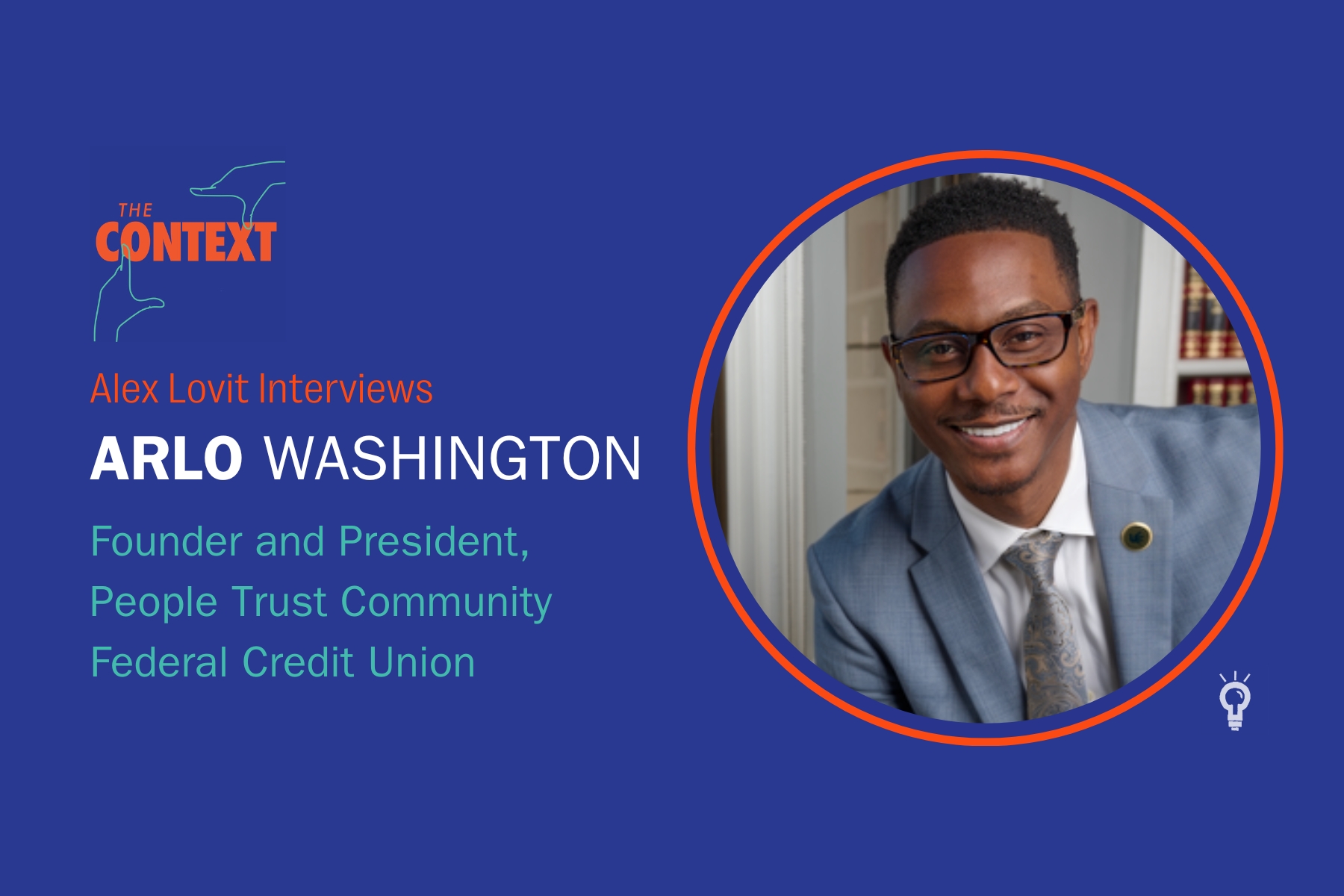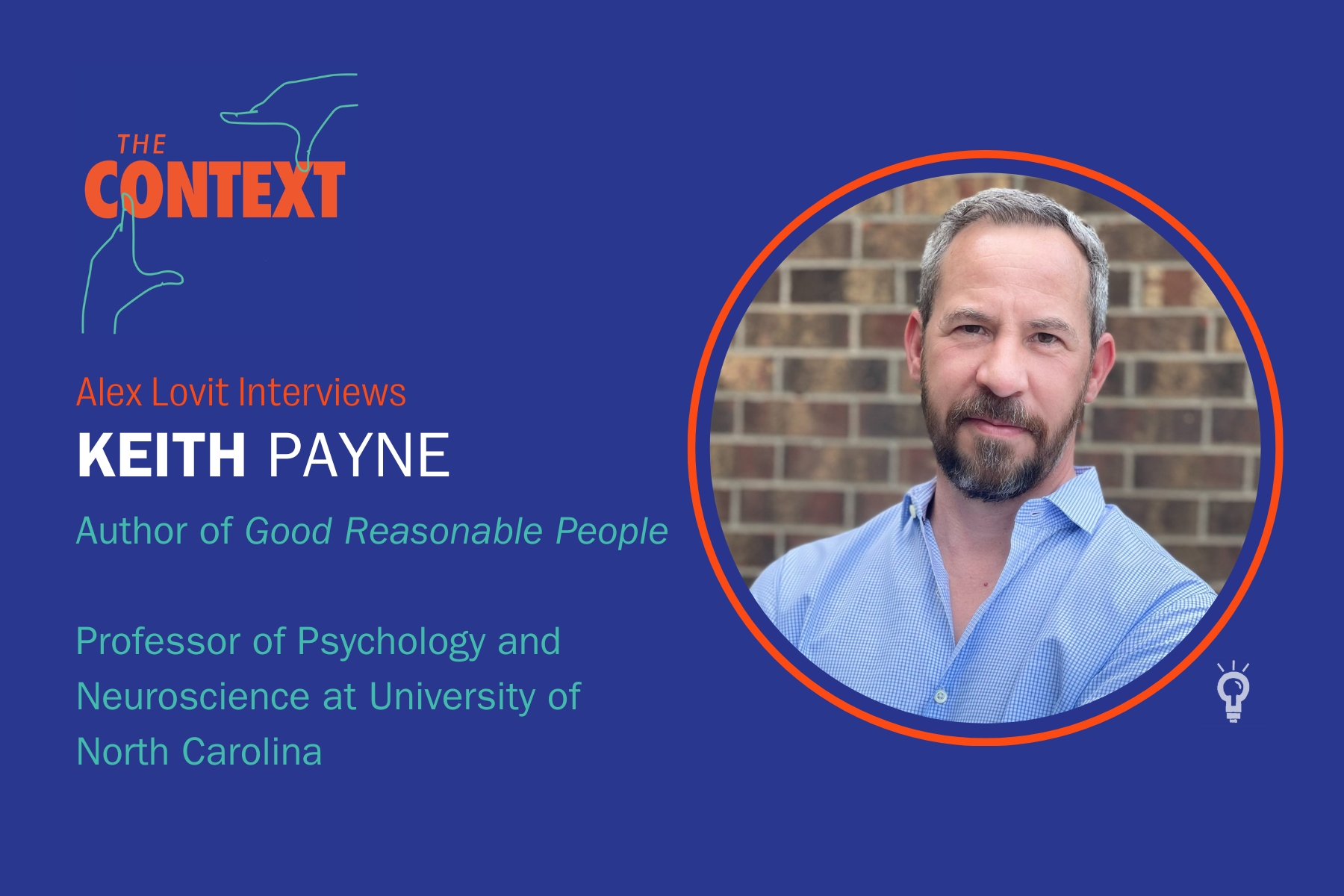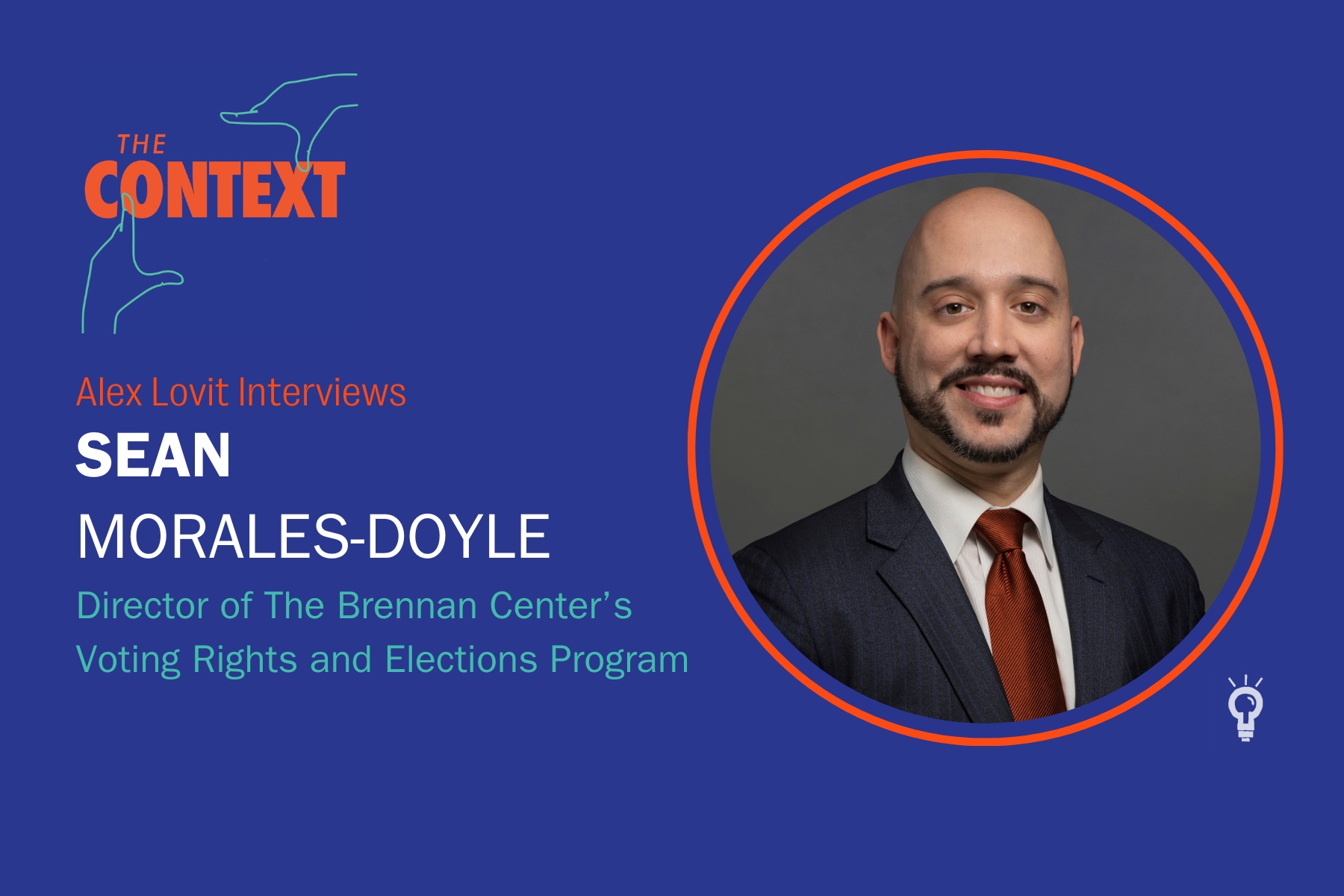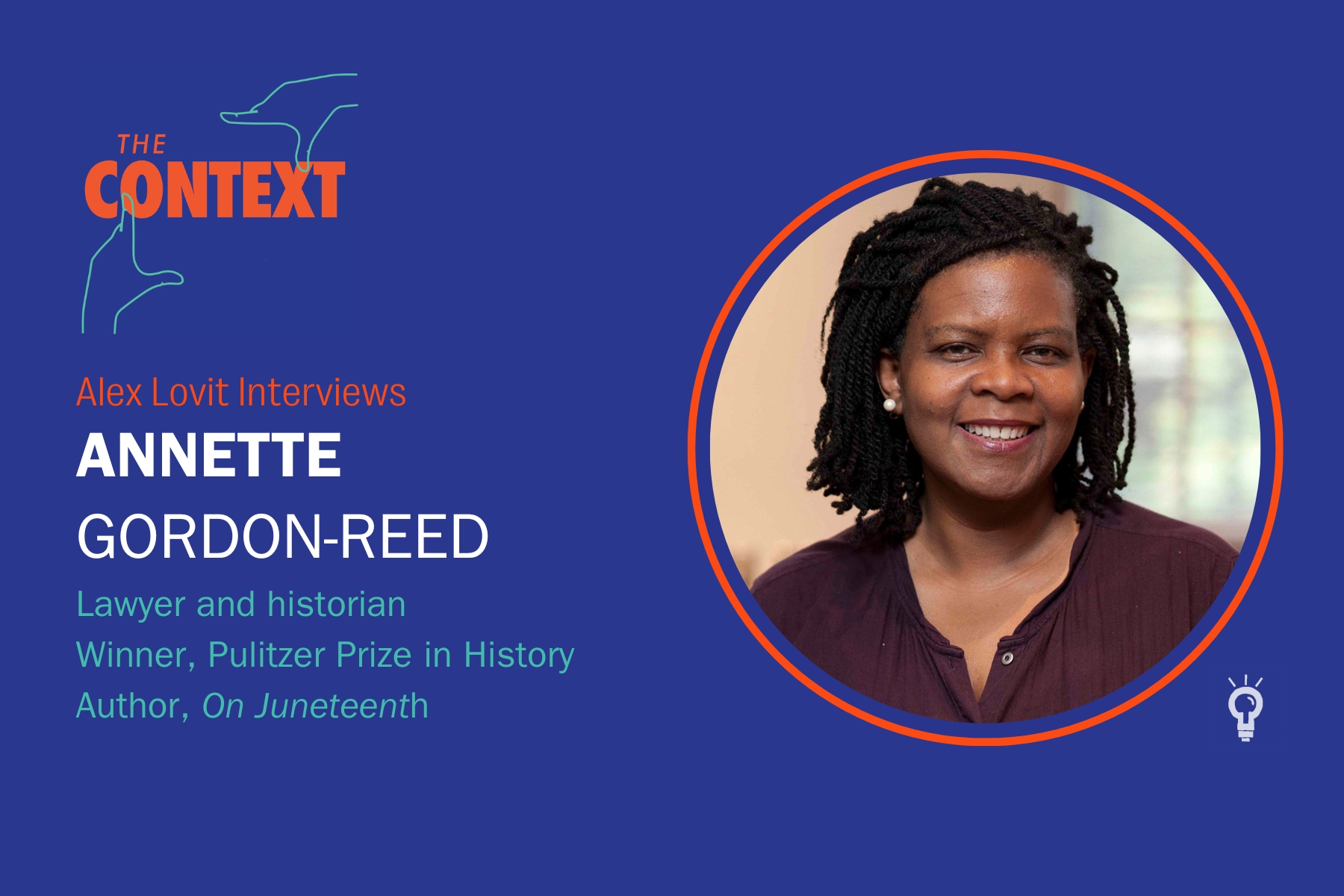Sarah Longwell: To Defend Democracy, Stop Talking about “Democracy”
Pro-democracy progressives are their own worst enemy when it comes to recruiting conservative Americans to their cause.
In part two of our conversation, political strategist Sarah Longwell offers suggestions for how to connect with anti-Trump conservatives. Her ideas draw on what she hears from voters in her frequent focus groups, as well as on her experience as a gay conservative fighting for inclusion in American society and politics in the 2010s.
Longwell is the publisher of The Bulwark and the cofounder and executive director of the advocacy organization Defending Democracy Together. She hosts The Focus Group podcast and is a senior fellow at the Charles F. Kettering Foundation.
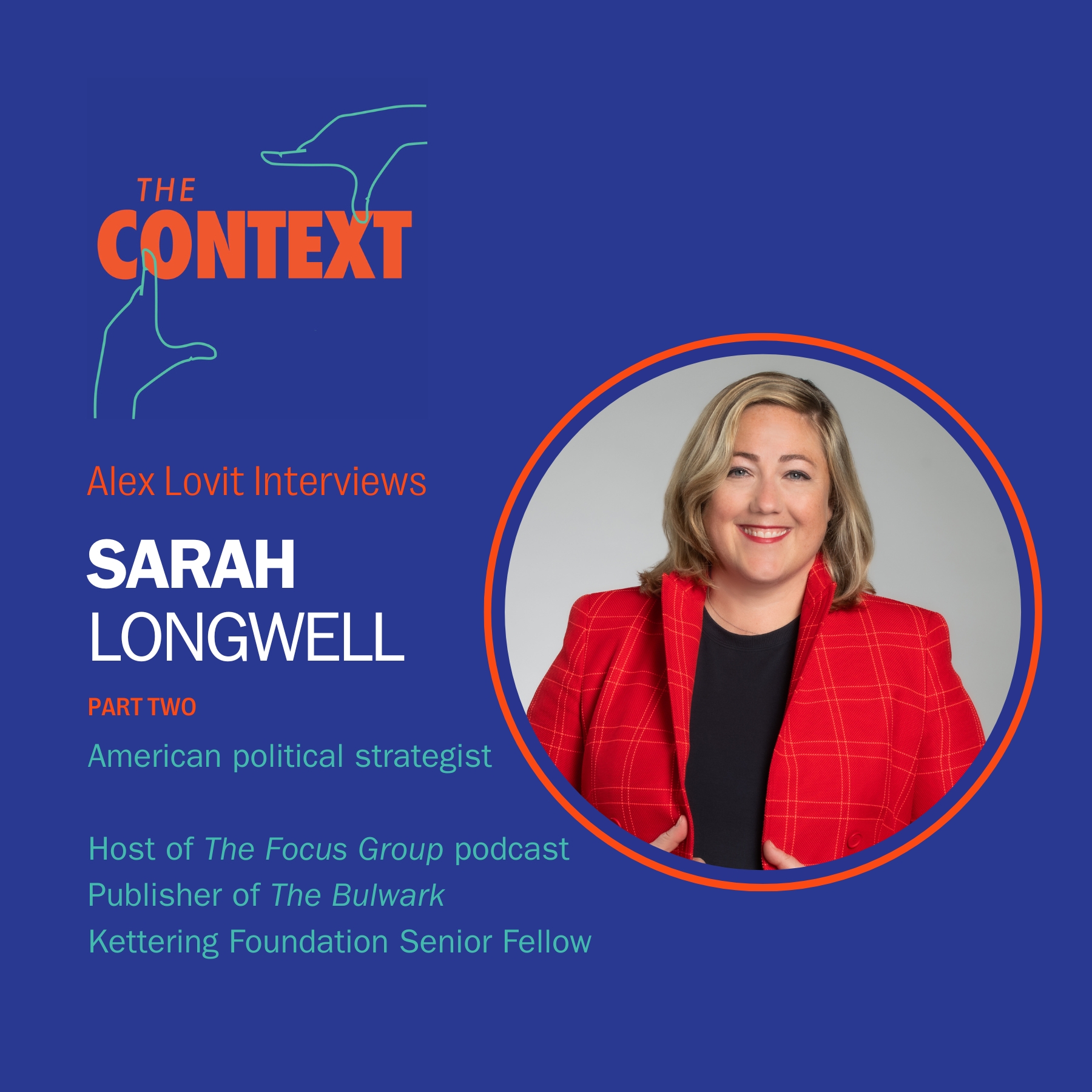
Share Episode
Sarah Longwell: To Defend Democracy, Stop Talking about “Democracy”
Pro-democracy progressives are their own worst enemy when it comes to recruiting conservative Americans to their cause.
In part two of our conversation, political strategist Sarah Longwell offers suggestions for how to connect with anti-Trump conservatives. Her ideas draw on what she hears from voters in her frequent focus groups, as well as on her experience as a gay conservative fighting for inclusion in American society and politics in the 2010s.
Longwell is the publisher of The Bulwark and the cofounder and executive director of the advocacy organization Defending Democracy Together. She hosts The Focus Group podcast and is a senior fellow at the Charles F. Kettering Foundation.

Share Episode
Sarah Longwell: To Defend Democracy, Stop Talking about “Democracy”
Listen & Subscribe
Pro-democracy progressives are their own worst enemy when it comes to recruiting conservative Americans to their cause.
In part two of our conversation, political strategist Sarah Longwell offers suggestions for how to connect with anti-Trump conservatives. Her ideas draw on what she hears from voters in her frequent focus groups, as well as on her experience as a gay conservative fighting for inclusion in American society and politics in the 2010s.
Longwell is the publisher of The Bulwark and the cofounder and executive director of the advocacy organization Defending Democracy Together. She hosts The Focus Group podcast and is a senior fellow at the Charles F. Kettering Foundation.
Alex Lovit: Donald Trump has repeatedly attacked foundational principles of American democracy. It’s tempting to think surely Trump supporters wouldn’t continue to support him if I just explained that what he’s doing is anti-democratic, but my guest today says this is the wrong way to think about democracy, and it’s definitely the wrong way to talk about it if we want Americans to join together and push back against authoritarianism.
You’re listening to The Context, a podcast from the Charles F. Kettering Foundation, about how to make democracy work for everyone, and why that’s so hard to do. I’m your host, Alex Lovit.
Today we’re bringing you part two of my conversation with Sarah Longwell. Sarah is the Founder and Publisher of The Bulwark, and host of The Focus Group Podcast. She’s also Cofounder and Executive Director of Defending Democracy Together, and she’s a Senior Fellow here at the Kettering Foundation.
Last week, Sarah described how Trump transformed the Republican Party so dramatically that it no longer represents her core conservative beliefs. This week, she’ll tell us how to unite Americans around a common goal of defending our most sacred principles. Now, here’s part two of my conversation with Sarah Longwell.
So maybe democracy needs a sales pitch right now, or anyway I’m going to ask you to make one. And democracy, it’s a little tough. It means I’m never going to get exactly what I want out of government because every other jerk walking around has just as much say as I do. Tell me, why should I want a democracy, why should I want to live in a democracy?
Sarah Longwell: Well, because America is the best place in the world, and we have done the most to build a society that is wealthy, that is the most multi-ethnic, multi-racial, pluralistic society. And I think that a lot of times people get caught up in our imperfections and they miss the constant striving to be a more perfect place.
One of the things that I think about, and was very formative for me, is that when I was growing up gay marriage was not a thing, wasn’t a thing anybody talked about. Barely anybody talked about what it meant to be gay, which is why when I realized I was gay it took me a very long time, and I was out of college. And then very quickly there was this conversation about gay marriage, and I became very involved as a young conservate for the freedom to marry, Log Cabin Republicans, which was the gay Republican group. And I just watched people change their minds. We talked to Americans—Christians, people who did not believe in gay marriage—there was a big conversation in the country about how are we going to accommodate this group of people and let them into this institution? And you can just watch the Americans change their mind in real-time during this conversation. That is a functioning democracy. We figured out how to do this. We changed public opinion, we had a talk as a country, and eventually we got there. The courts were involved and the legislature was involved.
And that has happened over and over. That happened with the Civil Rights Movement, it happened with the Women’s Rights Movement. I’m not a big fan of Bill Clinton, but one of my favorite quotations from him is “There’s nothing wrong with America that can’t be solved by what is right with America.”
And maybe it’s a complex system, but it is a system that has stood us in very good stead, and sometimes it means change happens a little slowly, but that’s okay, because we have the mechanism at our fingertips to make change. And so I believe, and have always believed, in what America is.
And I think that look, right now we’re at a time of big upheaval. People are a little bit tired of the creaky institutions, but again, that’s what’s great about democracy. We can reform these institutions. We can build new institutions. And I actually think that’s one of the ways to think most optimistically about democracy in this moment, is a lot of things are about to be torn down, and there’s a national conversation happening right now about what should be torn down, what should be preserved. I think a lot more is going to get torn down and people are going to come to appreciate the fact that some of that stuff shouldn’t have been torn down, but it does mean you get to build things anew.
Lincoln talked about this, right? “Now is the time to think anew, and act anew.” And so, democracy really is about a constant sense of rebirth while having these fundamentals that give us the opportunity to have that rebirth.
I do think the word democracy is very nonspecific for people, and I think people use it in more academic settings or nonprofit settings. And Americans, regular Americans don’t really talk about democracy. They talk about America, because democracy is that thing we do here, and so it’s a little bit like the water we swim in, the air we breathe, for Americans.
And it means different things to people. You say democracy, they’re like does that mean voting? What does that mean to people? Is it free speech, is it pluralism? But Americans really do have this, it’s that thing we do here. And if we want to tell a better story about democracy, we need to tell a better story about America, and why America has this constant opportunity for rebirth, why it’s a great place, why the system we built is unique among all others, and why so many people have wanted to emulate.
Alex Lovit: So, you have a whole podcast about focus groups, The Focus Group Podcast. It’s great. I really recommend it to folks listening to this. And you’re talking there about what voters want from politicians and what they expect from their government. I think you and I both believe American democracy is in crisis right now. How much of that is filtering down to voters? What are voters hearing, and what are they not hearing, what are they upset about, what are they not upset?
Sarah Longwell: So I’ve been tracking how voters think about democracy, using that word, for many years, and I want to tell you, how they think about democracy’s really evolved, and it’s been pretty interesting to mark the evolution. Because back in 2020-ish, 2019, you’re asking about democracy and Democrats would say Trump was a threat to democracy, but it wasn’t at the top of the way voters talked about things. And remember, we were in the middle of a pandemic, Black Lives Matters—democracy wasn’t the thing people would focus on.
So there was this big effort to get people to care about democracy, and there was a whole democracy movement to get people to care. And I watched as more and more people started to care about democracy—I saw this flip after January 6 and the 2020 election, where first it was that you’re trying to get people to care about democracy to understand the implications for democracy of Donald Trump, and then after January 6 you move to this place where democracy the word becomes polarized, where Republicans think Democrats are a threat to democracy because they stole the 2020 election and Democrats think Republicans are the threat to democracy because they lied about the election being stolen and attacked the Capitol on January 6.
So people were talking about democracy, and that’s when you start to see in polls people will say democracy matters a great deal to them. And a lot of people in the democracy movement I’m a part of were like, this is great, people really care about democracy. And I was like guys, bad news: a bunch of the people saying they care about democracy, a lot of it was Republicans who thought the left stole an election and they were the threat to democracy.
And now post-2024, I’ve got to tell you, you hear from a lot of Republicans and Independents that they felt the way the ‘24 election happened was very undemocratic, in that Joe Biden stepped down and there was no primary, that Kamala Harris just became the nominee.
And that’s why it’s a complicated question, the one about democracy, because there’s a lot going on in there. And so it is much less that you get people who are really grappling with what does it mean to have a President of the United States go after judges and go after law firms and threaten them using the power of the Presidency, threaten them so they feel the need to capitulate. Law firms and universities and media companies, they’re capitulating to Trump, many of them pre-capitulating, like don’t hurt me sir, here’s $100 million toward whatever legal thing you want.
And that to me is the real crisis. It was one thing to have one political party in the throes of abandoning all the things they once believed and all the things that make America great for this guy and for their own political expediency. It’s another thing to watch most of our major institutions doing it.
What I believe in the most, what I talk about the most now, and what I think about the most now, is how do you fight back against that, the elite collapse to Trump? And again, this weakness is alarming. You want us to have stronger antibodies to a person coming who is trying to be an authoritarian type, Orban-ish leader, who’s saying there’s probably a way I can be President again for the next term, and I’m going to sue everybody who say things I don’t like, and I’m going to go after the media and judges, everybody.
Now it’s going to take individuals, because the elite institutions are too scared. The only way to push back is for average Americans to say this is wrong.
One of the things that’s interesting about the way Americans do democracy is we put a lot of stock in the popular vote. Donald Trump won the popular vote, and I think that’s why you didn’t see the backlash to him this time that you did the first time. Now, also the first time was a real shock to the system, this time lesser so. But the pushback I think is just really starting to find its footing because there’s the sense that man, the majority of Americans wanted this. What do you do? If they wanted this, okay.
But in Donald Trump’s, even just in his first 100 days, he had moved so fast to break so many things, to thumb his nose at the Supreme Court, that I do think the elites are still scared but people aren’t. And so you have to rely on the bravery of the American people who are willing to speak up and say, here’s the negative impact of Donald Trump’s policies on me, on people I know.
And I do think it’s very importantly ultimately fort Donlad Trump’s presidency to be a failure. I’m glad he is being entirely incompetent around the economy—I’m not glad in the sense that I don’t want people to suffer as a result of his incompetence, but I do think him demonstrating a total lack of aptitude, the fact that he is breaking every promise. The idea that this autocratic person who was elected primarily for economic reasons, for that autocracy to be a failure in the eyes of the American people, to not work, to ultimately be deeply unpopular, that is the best outcome for democracy. It is the way we get out of this, is for people to look what happened with Trump and be able to say, that didn’t work. It was better when we had halfway-decent people.
Alex Lovit: Well, let’s bracket the economic question for a second, because I do want to get to that, but I want to focus on this question of democracy and what voters care about, and are they noticing that Trump is using the power of the Presidency to attack judges and lawyers and universities. You said earlier that the best hope for America now is the American people to reject this, but you also said that for the most part they aren’t paying that much attention, or it doesn’t strike them yet as a violation.
So how do we get there? Is this just a slow process that it’s going to take a while for folks to realize what’s happening and get upset about it? Are there ways that pro-democracy forces can make this more salient for voters?
Sarah Longwell: On the economics of it, I think for a lot of people to really feel like Donald Trump is a failure, it’s because they feel negative personal consequences in their own lives. And this is where Donald Trump promising to lower grocery prices, Donald Trump promising to lower the cost of housing, you know, on day one, going to do it immediately—the fact that people still feel a tremendous amount of economic pain, and then on top of that the injection of deep uncertainty into the markets around tariffs, supply chains, our access to goods in other countries, getting in fights with all of our allies and trading partners. You see the impact of this on Trump’s poll numbers.
And look, polls are—I’m a qual person in part because I think it can be dangerous to live and die by the polling. That being said, there’s a very consistent drop across all polls of Donald Trump’s approval rating. At the end of the first 100 days, he was the most unpopular President in the last 80 years by polling standards, and he has lost altitude on just about every issue—on immigration, on the economy.
When you start to see him polling in the low 40s and eventually my hope is that he gets into the mid 30s, it will be more because of the economy, because people do notice that. That is a lived experience. And this is the thing, when you listen to voters, what becomes abundantly clear is they vote on things they see and feel more than anything else. Which doesn’t mean there aren’t these things that they don’t see and feel that they can become obsessed with, or can become these side issues that matter or capture their imagination.
There’s more of this, I call it being red-pilled, but a big part of it is this idea of, I have decided that the things about liberals that annoy me, like pronouns or their position on trans issues, outweigh my commitment to the rule of law, to defending democracy around the world by supporting Ukraine. But the economy, and their lived experience in the economy, is the number one thing, especially for voters who aren’t paying that much attention, they’re not super partisan, they just vote for the person who’s going to make their life better.
When I say people aren’t paying attention as much, I really mean they’re not focused on these issues of democracy. And I think one of the reasons Donald Trump is losing altitude on immigration, for example, which is one of his strongest issues, people don’t necessarily think about this in the term of democracy, but they do understand that deporting people by mistake and sending them to an El Salvadorian prison and then refusing to get them back is bad. Not everybody. I listen to lots of voters in groups who say look, that guy is MS-13—which has not been proven—and so he deserved it.
But there’s enough Americans who say I’m not that comfortable with this, and we seem to be deporting a lot of people who don’t need to be deported accidentally. Or they’re like look, you said you were just going to deport criminals. Deport criminals, I want you to do that, but don’t deport this guy who’s been working next door for 20 years and is my neighbor.
And so that overreach, and Donald Trump will always do this, he will always overreach, and I think that is the way he starts to lose support on a lot of these things.
Alex Lovit: Yeah, but you see the economy as perhaps a bigger weak point for him than democracy issues?
Sarah Longwell: Yeah. Democrats made a huge mistake trying to run on democracy, because again the word democracy is not meaningful to people. This is where Donald Trump understands he needs to use the word America and not democracy, because again, for Americans it’s that thing we do here.
And I’ve done a lot of focus groups where I ask people about, do they think Donald Trump is an authoritarian, and they’ll say what do you mean, what’s an authoritarian? What does that mean? These terms and these words, this is one of the problems that I think the Democrats just have, is the language they use is often out of touch.
Now, you can teach people words, you can. I think right now AOC and Bernie are out there really trying to teach people what oligarchy means, and that’s good. It is good. This is how you move narratives. You can teach people. But if you just assume that people interpret the word democracy a certain way—and I think that was a big mistake—I think people assumed they interpreted democracy a certain way, and I think they thought that alone would be a galvanizing issue.
I don’t mean to say people don’t care about it at all, but it is not a central galvanizing issue in the way I think Joe Biden giving some speeches about democracy was. Joe Biden needed to be talking about the democracy. Yes, kitchen table issues are going to matter more.
Again though, walk and chew gum, I’ve been having this argument with Democrats lately. Like, hear what I’m saying: the economy is a lived experience, so people will know whether they feel good or bad about the economy, which doesn’t mean you don’t reenforce the negative way they feel about it by making sure they understand how Donald Trump’s policies are contributing to their negative experience with the economy.
And so I think again, figuring out that democracy’s not just this word you can say out there. It’s an active—you’ve got to explain to people which part of democracy you’re talking about. Are you talking about the free speech part, you’re talking about the pluralism part, talking about the law and order/due process part? You’ve got to be specific.
Alex Lovit: On this issue of democracy versus economy, and what’s more salient for voters, and how do you attack an authoritarian, I don’t see a flaw in your logic, but I’ll tell you what bothers me about it. It bugs me, the idea that if you had an authoritarian that was a little more economically competent, or maybe just more economically lucky, that democracy falls.
Sarah Longwell: This is what happened the first time. I mean, listen, yes, it should bug you. It is very bothersome that after January 6 and Donald Trump lying about an election being stolen and fomenting an insurrection against a free and fair election, that a bunch of people were like yeah, he can do this again, because I really liked how the economy was in 2019, pre-pandemic. Nostalgia for the pre-pandemic economy did so much to reelect Donald Trump.
And what do you and I want? Yes, what we want is for Americans to say under no circumstances would we elect somebody who lied about an election being stolen and then refused to abide by the results of that election. That’s disqualifying. I mean, there’s 100 things Donald Trump has done, each individually disqualifying. There’s him calling up Brad Raffensperger, telling him to find 11,000 votes, all the ways he’s broken the law. There’s the way he’s monetized the Presidency. He’s currently running a massive crypto scam, scamming people out of money. It’s the most corrupt thing you’ve ever seen. He’s doing the tariffs in part because he wants countries and businesses to come beg him for special dispensation.
Yes, what you want is for those things to bother people immensely, but the reality is that in this fragmented media environment, and until Democrats figure out how to communicate effectively in this fragmented media environment, and tell their story and go on offense aggressively, you’re going to have a tougher time—it is a little bit always been this way, right? Abstract concepts around democracy versus people’s pocketbooks, that’s a real thing, you are right. If Donald Trump right now, the economy was going great, we would be in a very different place.
Alex Lovit: It just makes democracy seem pretty weak, and I think maybe part of what—I wonder if you believe this—that part of what has made democracy weaker now is that there’s not a clear alternative, that the Cold War gave everyday Americans a sense of what the alternative to democracy was, and it was something they didn’t want.
Sarah Longwell: Yeah, I don’t know. We do have alternatives. It’s like China. And I actually think part of what’s happened since the Cold War—I’m not an expert in this, but I think there’s a fairly obvious piece of analysis here where Russia was an autocratic country, and things were, they were poor. It wasn’t going well. Whereas now, you’ve got Xi and China and an autocratic country that is economically competing with us. And there are a lot of people, like Orban, people who are democratically elected and then become autocrats after being democratically elected. Putin’s like that.
So I don’t think it’s just that we don’t have alternatives out there to provide a contrast. I think the world’s changed a lot since the Cold War. And again, I’m going to say this line again: if you want to tell a better story about democracy, you need to tell a better story about America, who we are. We are the stories we tell about ourselves, and I think one of the things that made us weak, made us ripe for this moment, was you had an American left who believed that America was a sexist, racist country, and had these myriad flaws, and they were obsessed with talking about how bad America was.
And Donald Trump came along and also told the darkest story about America: we’re a third-world country, and he mocked all of our values. And I think that now we’re in a place where more Americans than ever have a lukewarm feeling about America. And honestly, I think it’s been good for the American left to have to say hey, how do I reclaim patriotism? How do we take this back? Because I think the American left has grown increasingly more conscious about, they are America’s hope for democracy, because it’s not just Donald Trump now. There’s a movement that is behind him that has decided, yeah, maybe we’ll just ignore the courts.
Democrats have to figure out how to be not just a political party that has policies they want to advance, but how to be a pro-democracy party that also doesn’t sit around talking about democracy like academics all the time. It’s not the easiest thing in the world, and they have to rediscover how to make a pitch for what America is and can be, and why that’s good and worth fighting for and worth preserving, and why Donald Trump’s dark vision of America is wrong.
But it’s taken Democrats a little bit to switch gears from look at all these ways America is bad to wait, we’re better than what this guy is saying we are, wait a minute, this isn’t who we say we are.
And so, I think we are in a moment of struggling to retell the story about America, and what makes it great. We can’t just say America’s great, and we can’t just rely on American exceptionalism. We have to recommit to that, reteach people about it, remember the fundamental things that make us great, and lean on those.
Alex Lovit: And this is something I think about a lot. My academic background is in history, and there’s ongoing history wars over how we tell our own story. And I think what you’re describing is largely right: the left has told a fairly negative story of America, the right has told a mostly false story. What story would you tell? How do we tell a positive story about America that would get people invested in this abstract idea of America?
Sarah Longwell: I’m again going to repeat myself, but that Clinton line of “There’s nothing that is wrong with America that can’t be fixed by what is right with America.” And look how far we have come. And they didn’t say we were going to be perfect, they said we were going to be more perfect.
The reason I told the story about the gay marriage movement is because it was in my lifetime, watching how American democracy worked, how first you win the argument and then you win the vote, and you have to have this conversation, and it’s about teaching people and making a case. And it was appealing to people’s sense of fairness, to people’s sense of in America we don’t all have to be the same, we don’t all have to believe the same things.
And one of the best parts of the gay marriage movement was the deals they struck with the religious community to preserve religious freedom. I didn’t need anybody to force churches to perform gay marriages if they didn’t want to. That’s a good American way of working these things out.
And yeah, the pitch I would make is that every day we’re trying to figure out how to be more perfect, that we’ve gotten so much right and taught the whole world about the idea of the Constitution and the Declaration are miraculous documents. And it’s a miracle that a bunch of these old white guys who were slaveholders still put down in that document, no, no, no, we’re all equal. America’s always been this insane place full of contradictions in what we’re doing, but we work on it collectively all the time. It’s what’s magic about it.
To me, I look at Donald Trump and I say, and Elon Musk, and I’m like okay, they’re going to burn everything down. That’s their plan, just burn it down, because they don’t care. These are not builders, these are arsonists who are doing it for fun and their own personal inurement, and okay. What do we build once they’ve burned it all down? What do we get to decide comes next?
We don’t have to just defend everything that has been. If we’re going to tear it down, okay, what do we build in its place? And that to me, if you can get yourself to that orientation, you can get your happy warrior together, because you can be like okay, let’s get Trump to 32 percent approval, let’s declare this a failed experiment. Let’s elect somebody who demonstrates good qualities of leadership and knows how to communicate with the America people, tell them a good story about themselves, make them feel good about what this country is and can be again, and then let’s start building forward.
And I don’t want it to just be a contrast with other countries, that we’re like see, they’re so bad. I want us to face ourselves, because I think we can come out of this in a much stronger place. I want people to both understand how bad things are, but also how much opportunity there is in that if you fight for it.
Alex Lovit: So let’s talk about what that looks like in practice. Not everyone agrees on what the future for this country should look like. For example, Democrats have been pushing for a vision of the future that’s inclusive of trans people, and I’ve heard you say a couple of times that you’re hearing from voters that trans issues are part of what’s turning them off of the Democratic Party. But you yourself have experience as a gay woman of pushing for inclusion in a party and country that when the gay rights movement started didn’t accept you. So how do we make conservative voters come around on trans rights?
Sarah Longwell: Yeah, I mean, the trans issue, it’s hard for people to get their heads around a little bit, but so was gay marriage, so was the idea of two women and two men. And so some of this just comes with time. But also, there are some really interesting differences between the gay marriage movement and what’s happening right now with some of the issues around trans people.
Trans people should just be allowed to exist. And I don’t understand—like, I’m a big fan of Sarah McBride, the trans congresswoman. She’s the first elected trans congresswoman. And Republicans have been absolutely repugnant by making a whole thing about which bathroom she uses, and refusing to say her.
The way the trans issue, I would go on offense on, is to be like, could you not be such a jerk? Why does this live rent-free in your head? Why is it so important to you?
Now, I will say there’s an issue where, when it came to gay marriage, you could appeal to people’s sense of fairness. There’s this institution, and we’re not trying to change it, we’re just asking to be included in it. I think when you get into something like the sports issue, that starts to pull on people’s sense of fairness the other way.
You do want fairness, and I think we’re struggling through this issue. It’s a very new issue for the country, and there’s a lot of people who are going to react with reflexive bigotry, and then there’s a lot of people who are going to react with okay, somewhere in here there’s a compromise. Somewhere in here there’s an answer about how you be decent and inclusive but also fair.
And so, I don’t pretend to have all the answers on this one. What I do think is, and I think Sarah McBride has been doing this in a way that is deeply human and empathetic and the right way to go about this, which is to say we need to have a big tent in the Democratic Party that can have this conversation.
And I think, I listen to Americans all the time. They really are oftentimes decent, and want to do the decent thing. And so, the Republicans are really good at one of the worst things you can be good at, which is figuring out how to other people, and make those people the targets, the outgroup that you can scapegoat. And I think that’s what they’re doing to trans people. And I think if you can call them out for that but still be willing to have the more nuanced conversations in some of the tougher areas, that’s a thing that I think we’re going to have to do. Because it’s not just anyone who doesn’t think—who has an opinion on the trans sport issue is an absolute bigot.
I know this, coming out of the gay marriage thing: you’re never going to have a conversation that way. You’re never going to get to a good solution that way.
Alex Lovit: But, how does the conversation stay alive, when just mentioning trans rights or using someone’s pronouns correctly can derail the train?
Sarah Longwell: It’s funny when you do the focus groups—I do them all by Zoom, and you do Independents, you do Republicans. You never see pronouns in people’s things. Sometimes on the Dem side, you do. And when you see somebody’s pronouns in their email signature or whatever, it has told you not very much about their gender, but it’s told you everything you need to know about their politics.
And I think that if you want to save democracy—this is actually one of my frustrations with Democrats. We want to save democracy, and that means building the biggest, broadest pro-democracy coalition possible, and it means bringing folks in the center-right into the tent. One of the things that keeps those folks out of the tent is because they feel like some of the positions they hold, maybe that they think pronouns are stupid, for example, that they’re not allowed in that coalition. That’s the problem with the pro-democracy coalition overlapping quite a bit with the Democratic Party at the moment, because Republicans are the ones trying to destroy democracy.
This creates a complication, and it makes people who are center-right not feel like they want to be part of a coalition that does a bunch of things culturally that they’re like, this isn’t for me. It’s difficult to know—I’m not going to downplay the complexity of this—it’s difficult to know where are the lines that you say, I draw this line because as a human it’s something I don’t want to compromise on, to what’s the best way to protect trans people? What’s the absolute best way to protect them? It’s for Democrats to win elections against Republicans. And how do you win elections? It’s a game of addition, because winners make policy and losers go home.
I think that at some point you have to play some politics. You have to figure out how to be broadly popular. And I don’t think that means compromising all your values. I think there are ways to communicate about this effectively. And frankly, one of the easiest ways to communicate about it effectively is to acknowledge the complexity of it, because it’s complex for people. And I think people will give you that today. And if you are held hostage by groups who will give you no wriggle room to acknowledge the complexity of this situation, that is bad.
But I think broadly speaking, you can build a bigger coalition of fair-minded people by acknowledging these are complex, by saying that people who have different opinions on this can be involved in the same coalition and talk about them, which really was what we did with the gay marriage stuff. You weren’t going to win by calling everybody a bigot, you weren’t going to win by demanding they accede on every single term. You had to find some compromise positions. And again, that’s pluralism, and that is democracy.
Sometimes people are like, how can you be a gay Republican with the way that Republicans are on gay marriage? And I was like, Barack Obama wasn’t for gay marriage when he ran in 2008, because it was a politically unpalatable position and he was the first Black guy running for President. What was he supposed to do? And then what did he do? He evolved on it. You know why? Because the gay rights movement had done the work to make gay rights now politically popular.
And so I think it is difficult to ask Democratic politicians to walk the plank on an issue with voters that is deeply unpopular. That’s the job of the LGBT community, is to be like, you have to make this politically popular. And I think a lot of the groups on the left are in a moment where they are asking Democrats to walk the plank on a bunch of issues. Not just this issue, but immigration—I’m not sure there was anything more catastrophic that Joe Biden could’ve done than not have a secure border during his term. And so you’ve got let’s say groups on the left who say that was good, Biden needed to do it—okay, now we have Donald Trump again.
Alex Lovit: Well, fighting for what’s right while remaining electable is a difficult balancing act under the best of circumstances, and the stakes for American democracy are pretty high right now. So I’m glad we’re having this conversation, even though it feels like just the beginning.
Sarah Longwell, thank you for your insights, your work, and thank you for joining me on The Context.
Sarah Longwell: Thanks for having me.
Alex Lovit: The Context is a production of the Charles F. Kettering Foundation. Our producers are George Drake, Jr., and Emily Vaughn. Melinda Gilmore is our Director of Communications. The rest of our team includes Jamaal Bell, Tayo Clyburn, Jasmine Olaore, and Darla Minnich.
We’ll be back in two weeks with another conversation about democracy. In the meantime, visit our website, Kettering.org, to learn more about the foundation or to sign up for our newsletter.
If you have comments for the show, you can reach us at TheContext@Kettering.org. If you like the show, leave us a rating or a review wherever you get your podcasts, or just tell a friend about us.
I’m Alex Lovit. I’m a Senior Program Officer and Historian here at Kettering. Thanks for listening.
The views expressed during this program are critical to us having a productive dialogue, but they do not reflect the views or opinions of the Kettering Foundation. The Foundation’s broadcast and related promotional activities should not be construed as an endorsement of its content. The Foundation hereby disclaims liability to any party for direct, indirect, implied, punitive, special, incidental, or other consequential damages that may arise in connection with this broadcast, which is provided as-is and without warranties.
Transcripts are created on a rush deadline by a Kettering Foundation contractor and may contain small errors. The authoritative record is the audio recording.
More Episodes
- Published On: August 26, 2025
In the United States, today’s Republican Party is what political scientists call “personalist.” Power is concentrated with one individual, and other party...
- Published On: August 12, 2025
Steven Levitsky, a leading expert on authoritarian regimes, joins host Alex Lovit to talk about the US’s current slide into authoritarianism and...
- Published On: July 29, 2025
We can’t have a full democracy without financial justice. Host Alex Lovit speaks with Arlo Washington, a banker creating access to loans,...
- Published On: July 15, 2025
Americans are constantly arguing about politics—on the internet and at the family dinner table. But we rarely change one another’s minds, and...
- Published On: July 1, 2025
Voting rights are the foundation of democratic governance. But recent changes in elections policies have disenfranchised millions of Americans, and the voting...
- Published On: June 17, 2025
Juneteenth commemorates the end of slavery in the United States. Pulitzer Prize-winning historian Annette Gordon-Reed joins host Alex Lovit to discuss Juneteenth’s...


